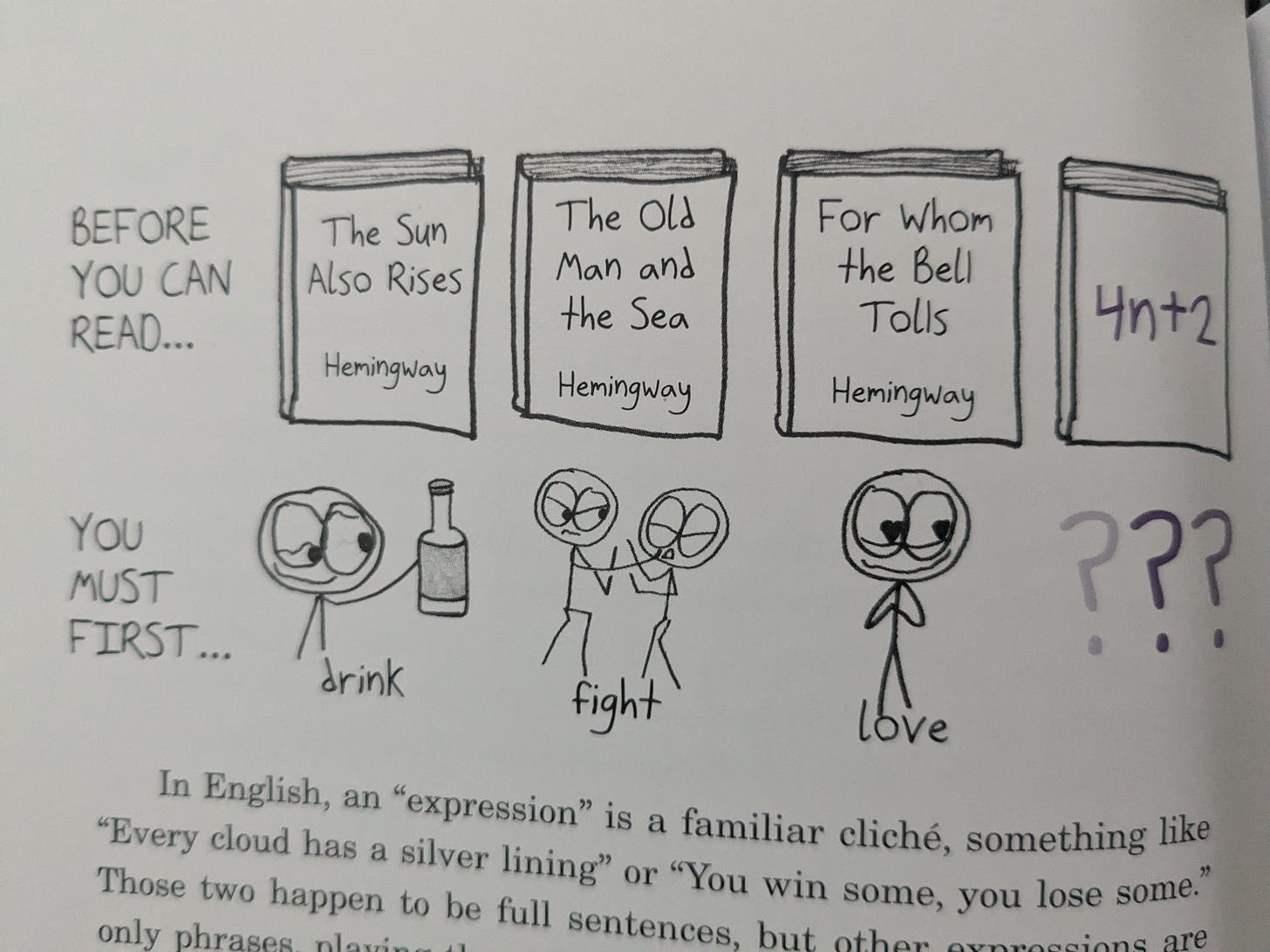Hemingway and Negative Numbers
Experience and learning
As a student, I couldn't make heads or tails of Ernest Hemingway. The terseness, the mud, the splashes of Spanish—it all baffled me (and I actually speak Spanish). When I mentioned my struggles to my friend Mike, he nodded. "Someone told me that before you can read Hemingway," he said, "you need to have done three things: gotten blackout drunk, been in a fistfight, and fallen in love."
I'm not 100% sure about the specifics, but Mike's larger point stands. To read literature, you need experience. Before reflecting on life, you have to do some living.
So what experience do you need, what kind of living is required, before you can read 4n + 2?
-Ben Orlin, Math for English Majors p. 1411
Learning works best when it’s connected to something you already know, to something you have experienced and understand. True for Hemingway, true for math.
I’m beginning our unit on operations with negative numbers this week.2 What experiences do students need to learn about negative numbers?
There are a few specific things I want students to know. I want them to be familiar with the negative part of the number line, placing whole numbers, decimals, and fractions. I want them to understand how to order negative numbers, for instance knowing that -2 is larger than -3. I want them to understand that negative numbers often mean opposites — if having money is positive, owing money is negative. If moving right is positive, moving left is negative.
Still, there’s more students need to be successful with negative numbers. As Orlin writes above, sometimes you need a certain amount of experience before you’re ready to learn something. That experience is more than learn skill A + learn skill B. That would be hollow. I want students to be confident with a few skills, but also to be familiar with negative numbers, to feel confident moving around the number line, to feel like negative numbers connect to their world, in a way that goes beyond distinct skills.
I’m starting this unit moving very slowly. The goal is to practice a few specific skills, like those I described above, but also to spend time solving lots of different problems about positive and negative numbers and number lines and contexts where we use negative numbers. I’m drawing resources from all over the place — JUMP, Illustrative Math, Desmos, DeltaMath, and more. I have some specific goals but I also just want students to think about negative numbers in lots of different ways before we get to the meat of adding, subtracting, multiplying, and dividing. There’s a lot of experience students need with negative numbers to build on when we get to the more abstract work of adding and subtracting next week. What we’re doing now can feel crunchy and aimless. There are a couple of specific goals we’re working on but also a lot of random stuff to build those experiences the rest of the unit will build on.
Something else Orlin writes about in his book is how idiosyncratic this type of knowledge is. There’s not some formula that works for every student. Every student comes in knowing some things about negative numbers, and not knowing others. That’s why I take my time early in a unit. My goal isn’t to rush, even though we’re delaying the most important skills. My goal is to take my time, give students lots of chances to become familiar with negative numbers, and have experiences we can build on so when we get to the arithmetic there’s something for that learning to stick to.
This book is great! You should read it.
Ok technically the unit is “rational numbers.” I can’t believe curricula call it that. What an opaque way to describe a unit to 7th graders who have no idea what rational numbers are.



Im a pre-service teacher doing my last placement in term 1 next year (Im from Aus!). I was considering using this resource: https://www.map.mathshell.org/lessons.php?unit=7105&collection=8 as a starting point for context. Now reading your posts for the last few weeks I'm questioning it! My year 7 class is an academic class (top class). But still. I am now considering simpler context questions for first lesson, a lesson on building conceptual understanding slowly as per your comments in "Conceptual Understanding Doesn't Happen All At Once" THEN letting them loose on this classroom challenge .. Thoughts?
The qualia beneath the quantia! I agree: restoring these flavors to the academic knowledge we want kids to learn is essential to having them love it… and learn it in the first place. Out of curiosity, what associations did you settle upon for negative numbers?